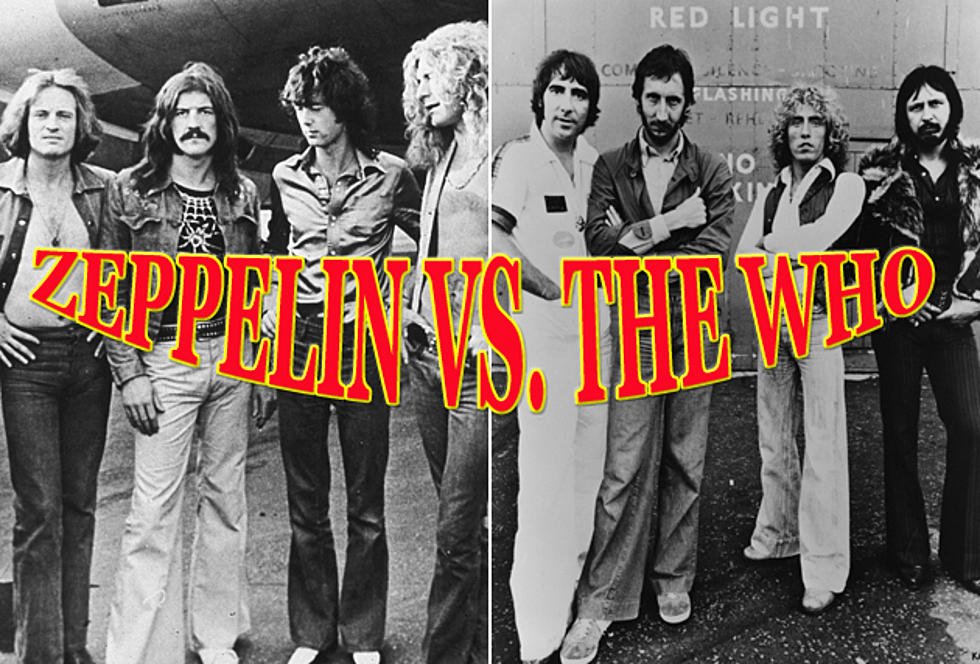Robert Plant, then 19 years old, was leading a new band named Hobbstweedle in 1968 when he received an invitation to play at a Birmingham teacher training college. Here was when Plant met Jimmy Page, who would go on to become a bandmate in Led Zeppelin, who just so happened to be looking for a new singer for The Yardbirds.
With a passionate performance of Jefferson Airplane’s “Somebody to Love,” Plant ended Page’s search. But the history of rock & roll almost turned out differently. Two years earlier, at a difficult period for The Who, 17-year-old Plant came dangerously close to taking Roger Daltrey’s place as the band’s main vocalist.
Pete Townshend recalled in 1990, “[Plant] came to see us three nights in a row and offered himself for the job, as did Steve Gibbons when he came to see us and Roger wasn’t there. Obviously, none of them thought I was any good [at singing]!”
By the end of the 1960s, Plant posed a major stylistic threat to Daltrey and Led Zeppelin, who were a dominant force in hard rock. Daltrey once told Classic Rock of Led Zeppelin, “When Led Zeppelin first came out, I thought they were fantastic, They supported us on one of their first gigs in the States. I thought they were brilliant.”
Daltrey continued, “Throughout our early history, we used to do loads of gigs with Hendrix and Cream, that three-piece-band-and-a-singer formula, We were well-schooled in that, but Zeppelin took it to another level. There was a power there. They were like Cream but with a lot more weight. Jack Bruce of Cream was really a jazz and blues singer, but Robert knew how to rock.”
As if this praise weren’t enough, in 2019 on Johnnie Walker’s BBC Radio 2 show, Daltrey named his Led Zeppelin counterpart as his “rock god.” Daltrey said, “Well, I was friends with Jimmy Page in the ’60s; I knew them from the very early years. It was Keith [Moon] who came up with the name Led Zeppelin. I became very good friends with Robert Plant, and we still are today. They supported us on one of their first US gigs in Washington or Baltimore. I know it was Maryland.”
Plant seems to have liked The Who in return, based on their years of touring together and the 1970s peak of both bands’ careers. The Who suffered tragedy in 1978 when Keith Moon, their drummer, overdosed on drugs unintentionally. Moon’s Led Zeppelin rival John Bonham had a similar end just two years later.
After their beloved drummer passed away in 1980, Led Zeppelin broke up, while The Who continued long after Moon passed away, concluding their first run in 1983. Since then, The Who have made many reunion tours and are still going strong today. Plant objects to this sort of loitering, a la Vegas residency.
Plant told Rolling Stone, “I saw the Who trundled around the stadiums of America, and I found it so dull, obvious and sad. The fact that they carried on without Keith Moon was always a mystery to me, but the fact that they did it again and again, augmenting it with more and more musicians … I don’t want to be a part of that aspect of entertainment. I’ve played Vegas already.”
Based on Plant’s objective evaluation of The Who’s later career diversions and Daltrey’s unreserved appreciation, it seems that there is no truth to the rumored split between the two bands. Pete Townshend, the guitarist for The Who, might be able to clarify things.
Townshend delivered a scathing critique of Led Zeppelin in a 1995 interview for the History of Rock ‘N’ Roll documentary, denouncing any similarities to The Who. He said, “I don’t like a single thing that they have done; I hate the fact that I’m ever even slightly compared to them, I just never ever liked them. It’s a real problem to me cause, as people, I think they are really great guys. Just never liked the band.”
Townshend’s criticism was directed only at the music of Led Zeppelin, not the band themselves. In a Toronto Sun interview conducted less than 25 years later, Townshend seemed to acknowledge that The Who and Led Zeppelin had a similar style, but he simply accused them of copying.
Townshend stated about the more contemporary artistic choices made by The Who. “It doesn’t sound like The Who from those early heavy metal years. We sort of invented heavy metal with [our first live album from 1970] Live at Leeds. We were copied by so many bands, principally by Led Zeppelin, you know, heavy drums, heavy bass, heavy lead guitar.”
All in all, it appears that Led Zeppelin and The Who had a cordial rivalry. It doesn’t take a rock historian to see stylistic and visual similarities between the bands. Pete Townshend believed that even though Led Zeppelin had copied The Who, the “great guys” had not produced a single song that was worth hearing.
